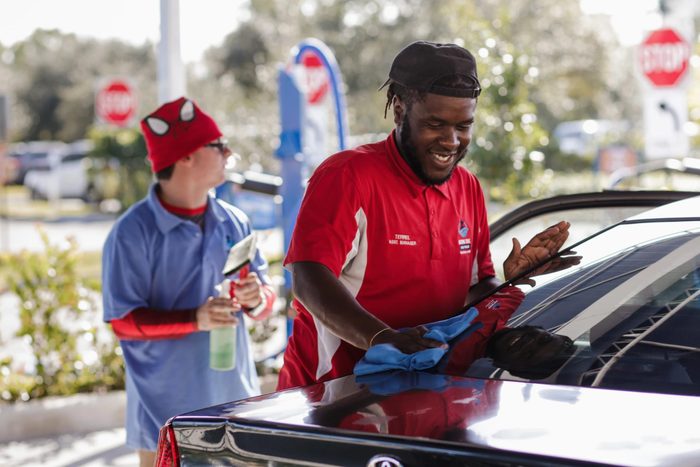An Autism-Friendly Workplace: Florida’s Rising Tide Car Wash
Updated: Jun. 13, 2023

This business run by neurodivergent people has multiplied sales volume more than five times since their founding. "It's a win-win," the owner says about harnessing employees' strengths.
More than 66% of young adults on the autism spectrum are unemployed, according to the Autism Society. This isn’t because people with autism can’t work, or because they’re not good at it—in fact, people with neurodivergence can have exceptional skills beyond their neurotypical peers. It’s because many workplaces aren’t designed with non-traditional workers in mind. “Our mission was to employ people with autism for 80% of our staff,” says Tom D’Eri, who co-founded the Miami area’s Rising Tide Car Wash with his father in 2013.
This mission was personal as D’Eri’s brother, Andrew, is on the autism spectrum. As the boys grew up, their family began to worry about the job prospects for a neurodivergent child. “We knew that to live a full life, Andrew was going to need help and there just weren’t many opportunities or programs for people with autism at that time,” D’Eri explains.
With one in 36 children diagnosed as being on the autism spectrum (and more who fly under the diagnostic radar), the D’Eris aren’t the only American family struggling with this issue. Their solution? They decided to create a business that would accommodate different types of neurodivergence—including workers with autism, Asperger’s, and ADHD. But they didn’t stop there: They wanted to create a workplace that would play to their employees’ strengths. As their website puts it: You might be thinking that we’ve succeeded in spite of our unusual workforce. The truth is that Rising Tide’s success is because of our unique team.
Since 2013, Rising Tide Car Wash has grown to three car washes in South Florida, serving nearly 200,000 customers a year (compared to 35,000 customers the business served each year before the D’Eri family bought it) and employing hundreds of people with neurodivergence. The goal is to provide job skills and a resume stepping stone to lifelong employment.
It’s working: “For most of our employees, this is their first job, and over half of them go on to successful employment at other jobs,” he says. “They learn skills that translate beyond washing cars, like how to take feedback, be resilient and persistent, learn from their mistakes, and work with others.”
The 8 Signs You May Be On the Autism Spectrum
What makes a workplace autism-friendly
How do workplaces like Rising Tide Car Wash, which are designed for non-traditional employees, differ from “traditional” jobs? In 2023, HarperCollins published Tom D’Eri’s book, The Power of Potential: How a Nontraditional Workforce Can Lead You to Run Your Business Better. In the book, D’Eri says that the biggest difference is in how the management team gives and gets information.
Ditch implicit directions and expectations—all those “unspoken rules” can make regular workplaces difficult for people with autism to navigate. “Everything at Rising Tide is clear and stated explicitly—from the hiring process and job descriptions to processes, promotions, and employee evaluations,” he says. “Nothing is ever assumed or inferred.”
This starts with a hiring practice that focuses on their skills rather than likability, which D’Eri suggests is the primary hiring criterion of traditional employers. “We do a job audition where they work on real cars, which gives us actual data on if they can do the job requirements,” he explains.
In addition, the business strives to present all information in several different formats, like visual posters, videos, audio directions, and written instructions. Color-coded checklists are a top method for helping workers attain success and deliver customer satisfaction.
Finally, Rising Tide keeps the job process-driven, focused on providing structure and routine—two things that people with neurodivergence thrive on, D’Eri says.
13 Things Experts Wish People Knew About Autism
Strengths that people with neurodivergence bring to a workplace
“Every person with autism is unique and shouldn’t be put in a box,” D’Eri says. “Forget the ‘rain man’ stereotype. There’s not a one-size-fits-all solution.”
That said, there are some common strengths this business has seen in their employees. D’Eri says people with autism, Asperger’s, and ADHD are generally more likely to:
- Be more accurate in following processes
- Less likely to cut corners (“There’s a lot less ‘I’m gonna do this my own way’ mentality,” D’Eri says.)
- Work consistently for longer periods of time
- Have exceptional attention to detail
- Be very honest
- Take deep pride in their work
“These are people who’ve struggled their whole lives and have been taught they need to cover their ‘weaknesses’ in society,” D’Eri says. “We teach them that these are strengths and they strive hard to prove themselves, giving 110%.”
18 Autism Myths Doctors Wish You’d Stop Believing
What every business leader can learn from Rising Tide Car Wash
Businesses should focus on finding the strengths of their workers and identifying obstacles to their success, and then be flexible in designing processes that adapt to those things. Basically, you want to create a workplace that adapts to your workers rather than trying to force workers to fit into their workplace.
“A business that can do this will become a better workplace for everyone, including their neurotypical employees,” D’Eri says. “And a business with happy, empowered employees will then be more successful. Everyone benefits. It’s a win-win.”
For inspiration in your inbox daily, get The Healthy @Reader’s Digest newsletter and follow The Healthy on Facebook, Instagram, and Twitter. Keep reading:














